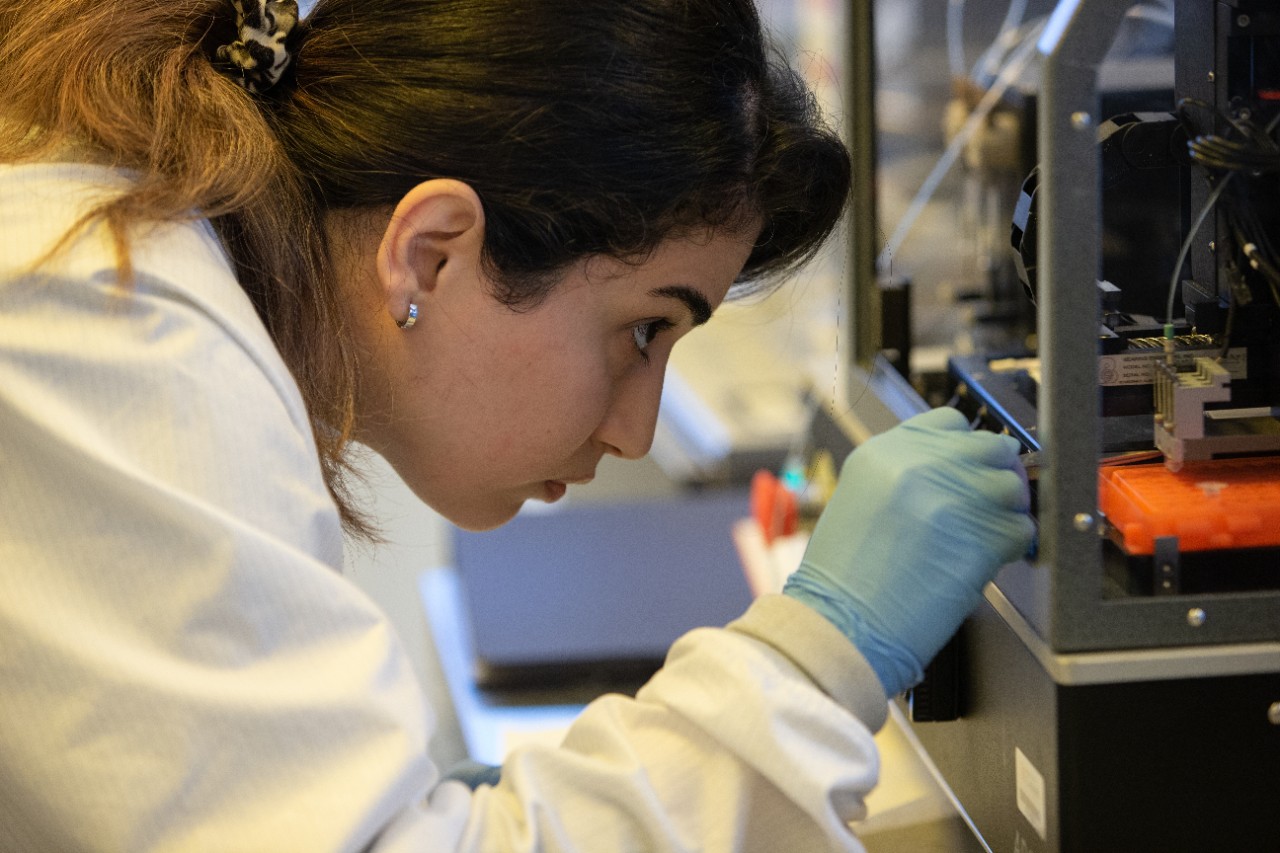
Stressed out? UC device can tell you
University of Cincinnati engineers create a simple test that can measure stress hormones in sweat, blood, urine or saliva
Stress is often called “the silent killer” because of its stealthy and mysterious effects on everything from heart disease to mental health.
Now researchers at the University of Cincinnati have developed a new test that can easily and simply measure common stress hormones using sweat, blood, urine or saliva. Eventually, they hope to turn their ideas into a simple device that patients can use at home to monitor their health.
The results were published this month in the journal American Chemical Society Sensors.
“I wanted something that’s simple and easy to interpret,” said Andrew Steckl, an Ohio Eminent Scholar and professor of electrical engineering in UC’s College of Engineering and Applied Science.
“This may not give you all the information, but it tells you whether you need a professional who can take over,” Steckl said.
The breakthrough was made possible because of UC's commitment to research as described in its strategic direction called Next Lives Here.
We're device engineers at heart.
Andrew Steckl, Ohio Eminent Scholar and UC engineering professor
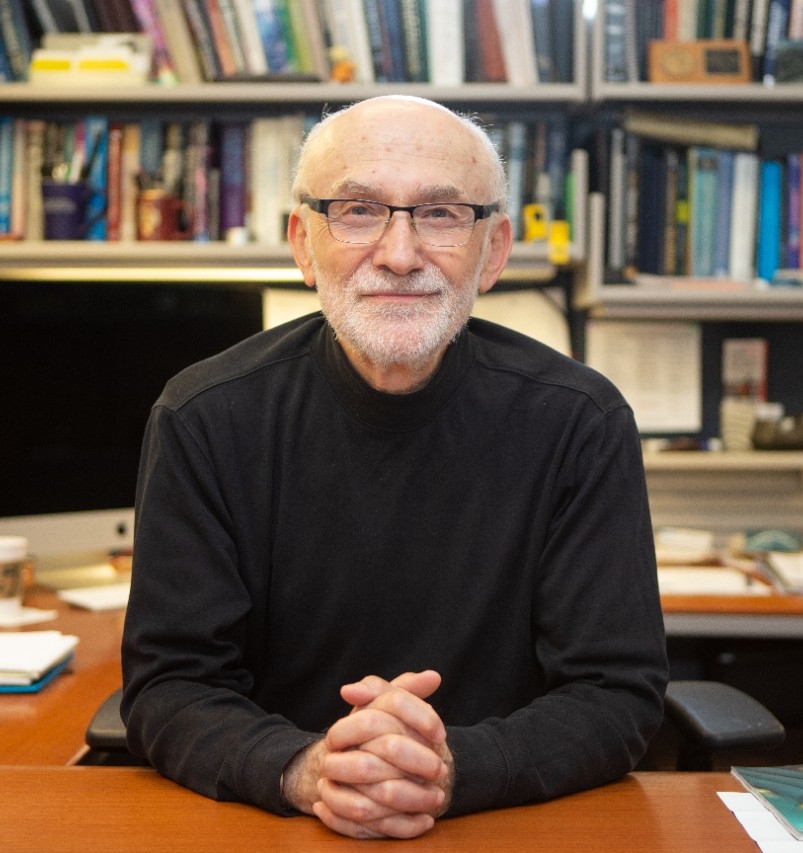
Ohio Eminent Scholar and UC engineering professor Andrew Steckl is developing simple home tests to track your health. Photo/Andrew Higley/UC Creative Services
UC researchers developed a device that uses ultraviolet light to measure stress hormones in a drop of blood, sweat, urine or saliva. These stress biomarkers are found in all of these fluids, albeit in different quantities, Steckl said.
“It measures not just one biomarker but multiple biomarkers. And it can be applied to different bodily fluids. That’s what’s unique,” he said.
Steckl has been studying biosensors for years in his Nanoelectronics Laboratory. The latest journal article is part of a series of research papers his group has written on biosensors, including one that provides a review of methods for point-of-care diagnostics of stress biomarkers.
Personal experience helping his father with a health crisis informed his research and opinion that a home test for various health concerns would be incredibly helpful.
“I had to take him quite often to the lab or doctor to have tests done to adjust his medication. I thought it would be great if he could just do the tests himself to see if he was in trouble or just imagining things,” Steckl said. “This doesn’t replace laboratory tests, but it could tell patients more or less where they are.”
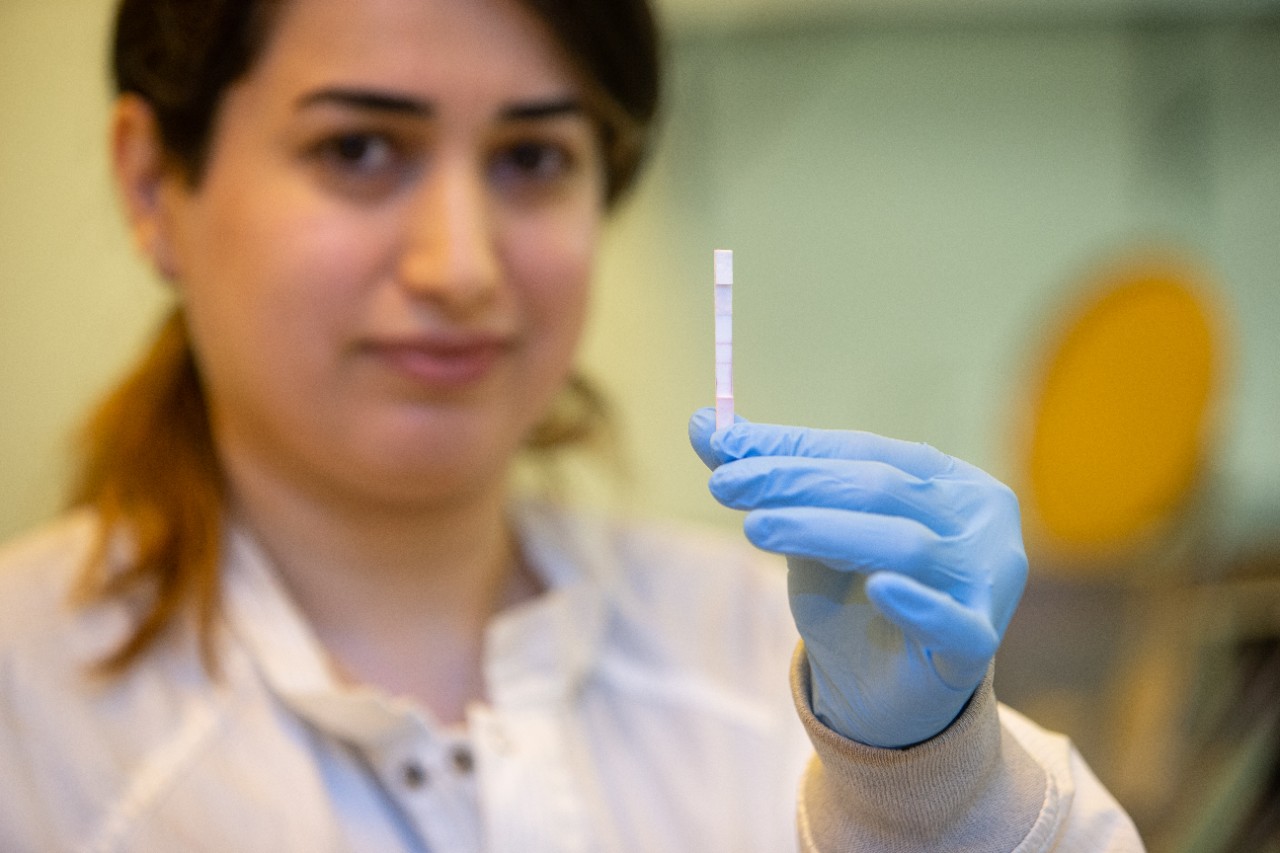
UC physics research assistant Shima Dalirirad holds up a sensor in UC professor Andrew Steckl's Nanoelectronics Laboratory. Dalirirad conducted a related study on detecting cortisol in sweat that was published this year in the journal "Sensors and Actuators B: Chemistry." Photo/Andrew Higley/UC Creative Services
UC received grant funding for the project from the National Science Foundation and the U.S. Air Force Research Lab. Steckl said the military studies acute stress in its pilots and others who are pushing the edges of human performance.
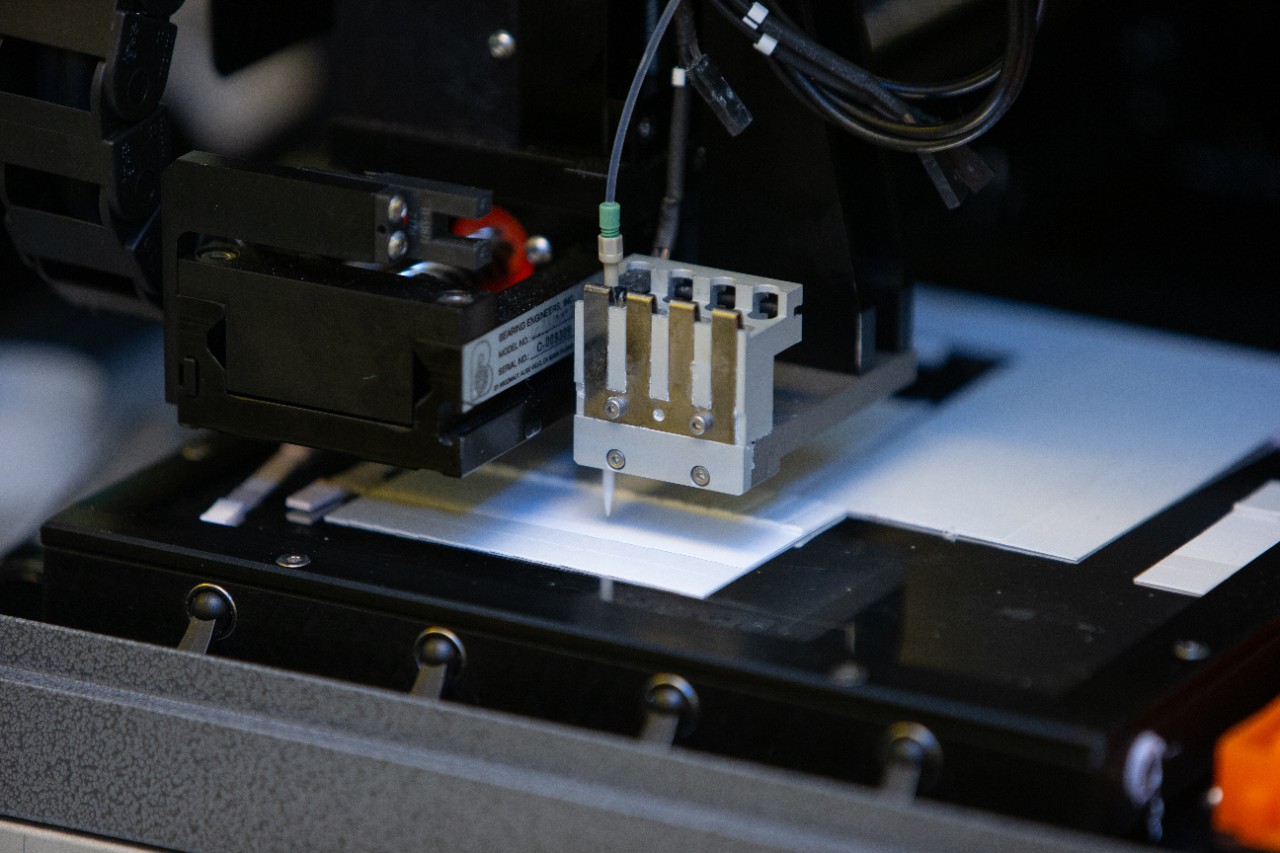
A machine in UC's Nanoelectronics Laboratory makes test strips that can measure stress biomarkers. Photo/Andrew Higley/UC Creative Services
“Pilots are placed under enormous stress during missions. The ground controller would like to know when the pilot is reaching the end of his or her ability to control the mission properly and pull them out before a catastrophic ending,” Steckl said.
But the UC device has widespread applications, Steckl said. His lab is pursuing the commercial possibilities.
“You’re not going to replace a full-panel laboratory blood test. That’s not the intent,” Steckl said. “But if you’re able to do the test at home because you’re not feeling well and want to know where you stand, this will tell whether your condition has changed a little or a lot.”
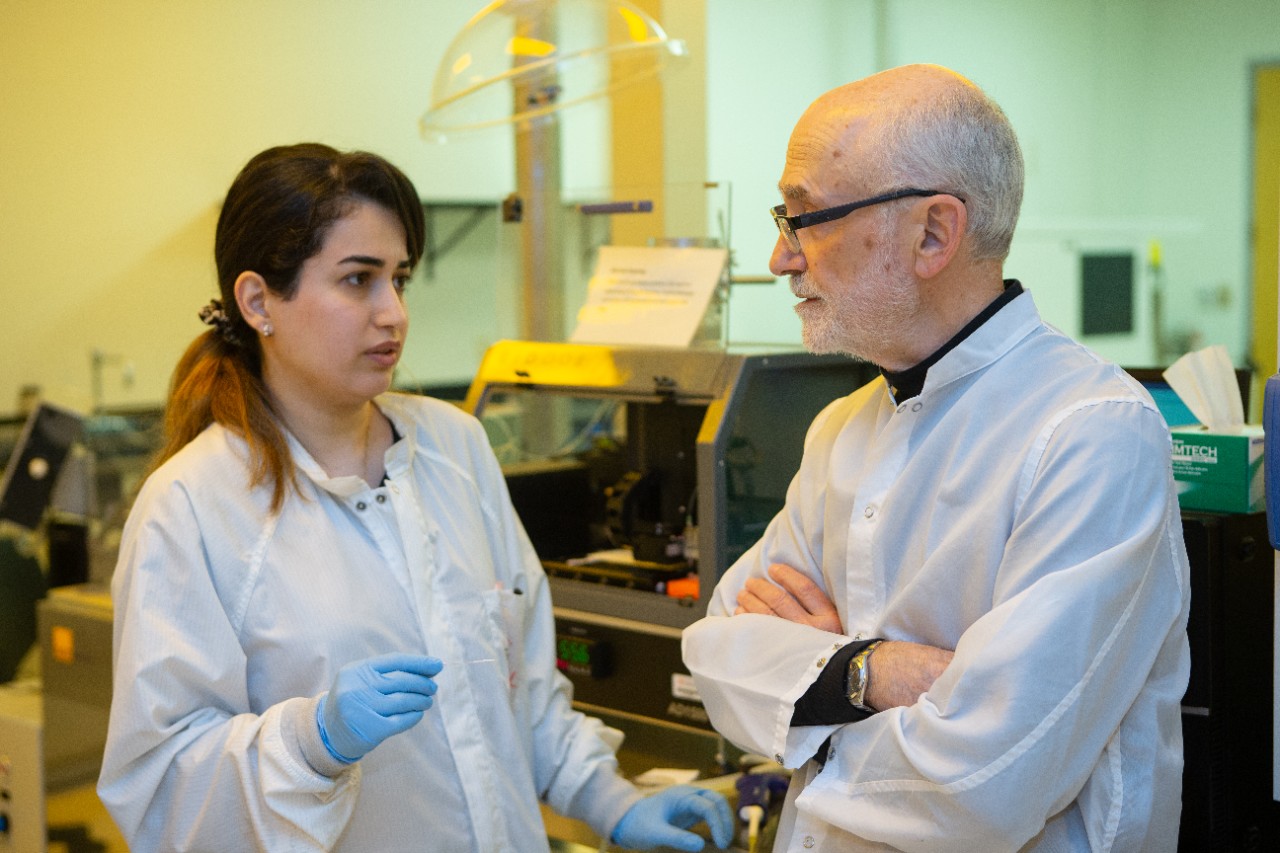
UC physics research assistant Shima Dalirirad talks with UC professor Andrew Steckl in UC's Nanoelectronics Laboratory. Dalirirad conducted a related study on detecting cortisol in sweat that was published this year in the journal "Sensors and Actuators B: Chemistry." Photo/Andrew Higley/UC Creative Services
UC graduate Prajokta Ray, the study’s first author, said she was excited to work on such a pressing problem for her Ph.D. studies.
“Stress harms us in so many ways. And it sneaks up on you. You don’t know how devastating a short or long duration of stress can be,” Ray said. “So many physical ailments such as diabetes, high blood pressure and neurological or psychological disorders are attributed to stress the patient has gone through. That’s what interested me.”
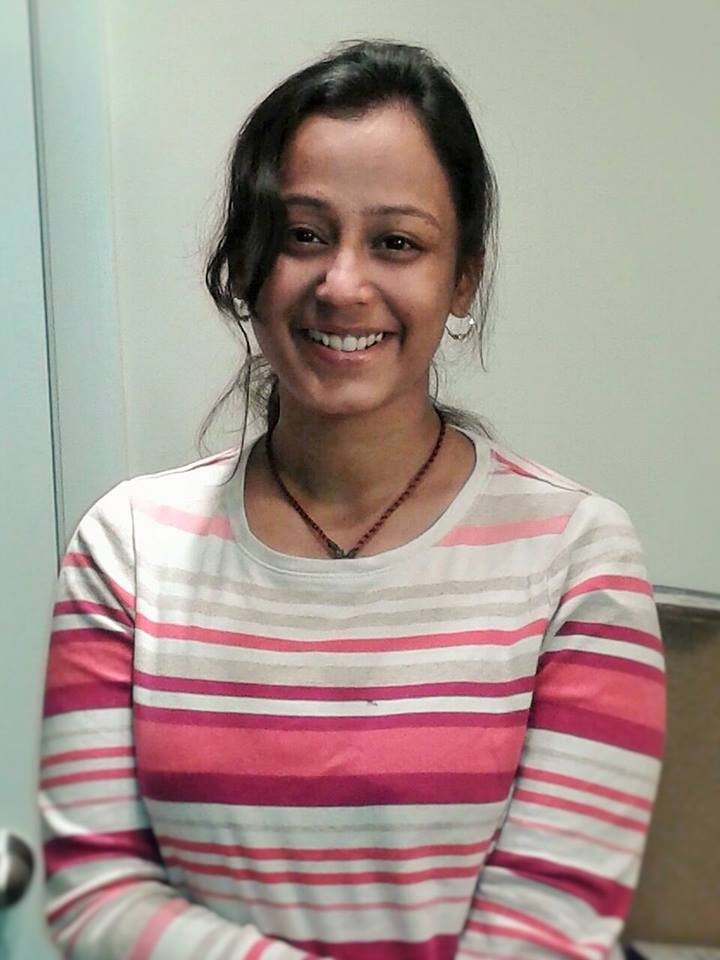
UC graduate Prajokta Ray was the lead author in a study on detecting stress biomarkers that was published in the journal "American Chemical Society Sensors." Photo/Provided
Ray said taking exams always gave her stress. Understanding how stress affects you individually could be extremely valuable, she said.
“Stress has been a hot topic over the past couple years. Researchers have tried very hard to develop a test that is cheap and easy and effective and detect these hormones in low concentrations,” she said. “This test has the potential to make a strong commercial device. It would be great to see the research go in that direction.”
UC is at the forefront of biosensor technology. Its labs are examining continuous sweat testing and point-of-care diagnostics for everything from traumatic brain injury to lead poisoning.
Steckl, too, has been a preeminent innovator at UC. His papers have been cited more than 13,000 times, according to Google Scholar. In 2016, he used salmon sperm, a common byproduct of the fishing industry, to replace rare earth metals used in light-emitting diodes for a new kind of organic LED.
“We’re device engineers at heart,” Steckl said. “We don’t shy away from things we don’t know much about to begin with. We look for opportunities. That’s a hallmark of electrical engineers. We’re not smart enough not to go where we shouldn’t. Sometimes that pays off!”
Featured image at top: UC research assistant Shima Dalirirad adjusts a machine that prints test strips in UC's Nanoelectronics Laboratory. Photo/Andrew Higley/UC Creative Services
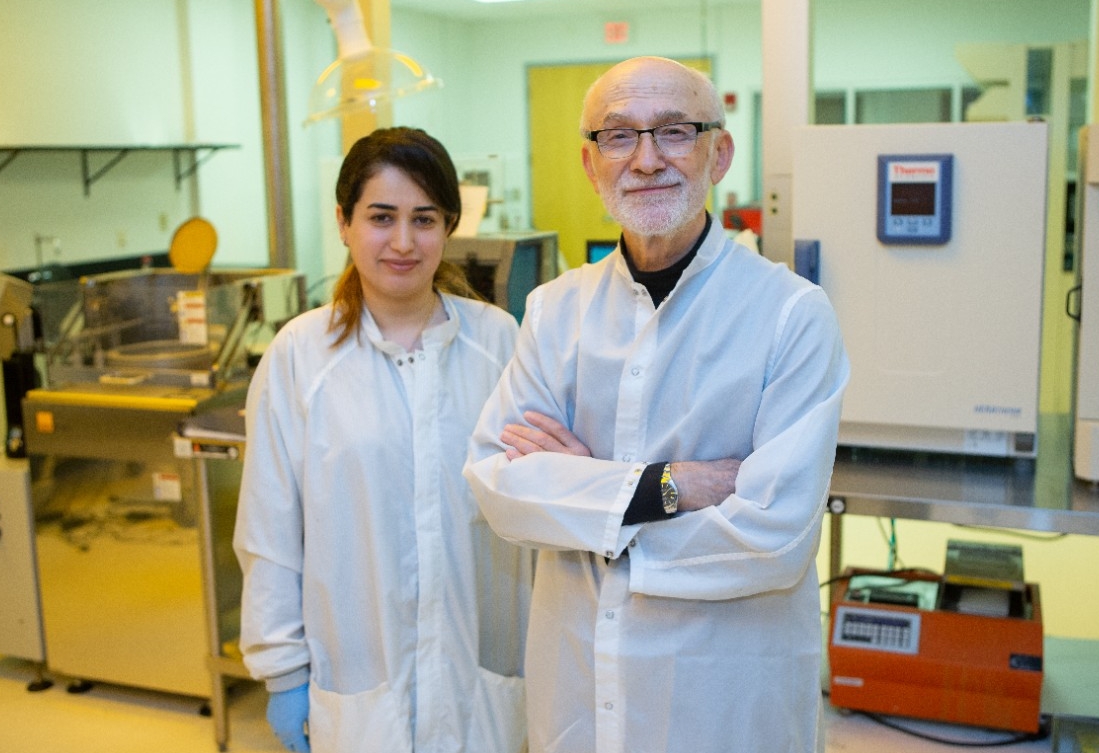
UC physics research assistant Shima Dalirirad, left, and UC professor Andrew Steckl pose in UC's Nanoelectronics Laboratory. Photo/Andrew Higley/UC Creative Services
Next Lives Here
Discover UC's commitment to Next Lives Here, the strategic direction with designs on leading urban public universities into a new era of innovation and impact.
Become a Bearcat
Apply online or get more information about undergraduate enrollment by calling 513-556-1100. Learn more about UC's many undergraduate and graduate programs.
Related Stories
First-ever Gen-Z Insights event hosted by UC NEXT Innovation...
April 19, 2024
In academia, the intersection of innovation, collaboration and the fresh perspectives of the University of Cincinnati NEXT Innovation Scholars (NIS) holds immense promise. As a multi-disciplinary student group of innovators, the program balances university, corporate and non-profit partners. NIS students are driven by curiosity, passion, future creation and pursuing innovation, fostering a community of forward-thinkers poised to tackle tomorrow's challenges today. Recently, these young visionaries hosted an inaugural Gen-Z Insights showcase event at the UC 1819 Innovation Hub. The packed room of attendees included 1819 corporate partners such as Kao and Main Street Ventures and distinguished faculty and staff members. All were eager to hear and learn more from NIS scholars and the industry projects they worked on throughout the year.
UC's CECH recognizes students, faculty and staff for outstanding...
April 19, 2024
In the early weeks of April 2024, UC's College of Education, Criminal Justice, Human Services, and Information Technology recognized and celebrated students, faculty and staff achievements annual Outstanding Student Awards and All College Awards ceremony, the latter of which awarded both Faculty and Staff Awards and the college's Golden Apple Awards.
WVXU: Test your word puzzle skills with a Cincinnati...
April 18, 2024
Cincinnati edition host Lucy May discusses the history and new found popularity of word games with Michael Griffith, professor English. Griffith is a writer, but also develops word games for publication.
